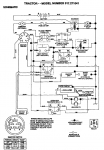Richie F
Well-Known Member
- Joined
- Aug 8, 2019
- Threads
- 25
- Messages
- 299
Fixing up a 1988 MTD Yard Machine and there is a 7.5 amp fuse in it.
Any electrical diagram always shows a 20 amp fuse.
Machine starts and runs fine.
The only thing I can Google and find is, if there is a short somewhere in the wiring it will blow.
So why must it be a 20 amp when the 7.5 does the same protection job ?
Thanks
Any electrical diagram always shows a 20 amp fuse.
Machine starts and runs fine.
The only thing I can Google and find is, if there is a short somewhere in the wiring it will blow.
So why must it be a 20 amp when the 7.5 does the same protection job ?
Thanks

